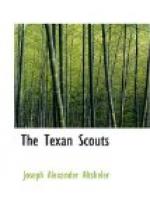“Ah, the Alamo!” said Obed White. His face clouded at the words. He was thinking then of the gallant youth who had escaped with him from the dungeon under the sea in the castle of San Juan de Ulua, and who had been his comrade in the long and perilous flight through Mexico into Texas. The heart of the Maine man, alone in the world, had turned strongly to Ned Fulton, and mourning him as one dead he also mourned him as a son. But as he rarely talked of the things that affected him most, he seldom mentioned Ned. The Panther was less restrained.
“We’ve got a big score to settle for the Alamo,” he said. “Some good friends of mine went down forever in that old mission an’ there was that boy, Ned Fulton. I s’pose it ain’t so bad to be cut off when you’re old, an’ you’ve had most of your life, but it does look bad for a strong, fine boy just turnin’ into a man to come straight up ag’inst the dead wall.”
Will Allen said nothing, but unbidden water forced itself to his eyes. He and Ned had become the strongest of friends and comrades.
“After all that’s been done to our people,” said the Panther, “I feel like rippin’ an’ r’arin’ an’ chawin’ the rest of my life.”
“We’ll have the chance to do all of it we want, judgin’ from the way things are goin’,” said “Deaf” Smith.
Then they relapsed into silence, and rode on through the timber, going slowly as they were compelled to pick their way in the underbrush. It was now nearly noon, and a brilliant sun shone overhead, but the foliage of young spring was heavy on trees and bushes, and it gave them at the same time shade and shelter.
As they rode they watched everywhere for a trail. If either Texans or Mexicans had passed they wanted to know why, and when. They came at last to hoofprints in the soft bank of the river, indicating that horses—undoubtedly with men on their backs—had crossed here. The skilled trailers calculated the number at more than fifteen, perhaps more than twenty, and they followed their path across the timber and out upon the prairie.
When the hoofprints were more clearly discernible in the grass they saw that they had been made by unshod feet, and they were mystified, but they followed cautiously or, for two or three miles, when “Deaf” Smith saw something gleaming by the track. He alighted and picked up a painted feather.
“It’s simple now,” he said. “We’ve been followin’ the trail of Indians. They wouldn’t be in this part of the country, ‘less they were helpin’ the Mexicans, an’ I guess they were at Goliad, leavin’ after the business there was finished.”
“You’re right, Deaf,” said Karnes. “That ’counts for the unshod hoofs. It ain’t worth while for us to follow them any longer, so I guess we’d better turn back to the timber.”
Safety obviously demanded this course, and soon they were again in the forest, riding near the San Antonio and down its stream. They struck the trail of a bear, then they roused up a deer in the thickets, but big game had no attraction for them now, and they went on, leaving bear and deer in peace. Then the sharp eyes of the Panther saw the print of a human foot on the river bank. He soon saw three or four more such traces leading into the forest, where the trail was lost.




